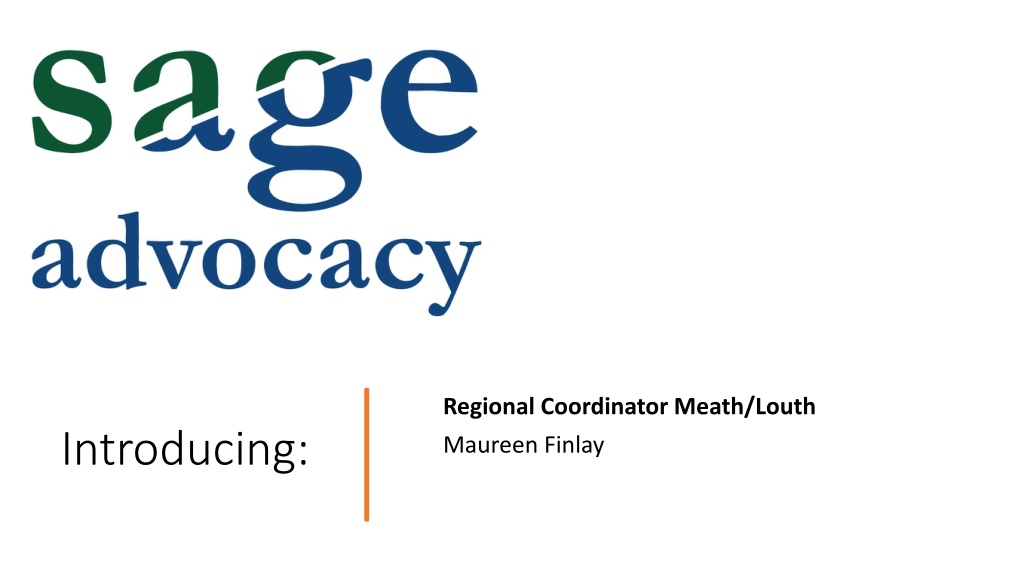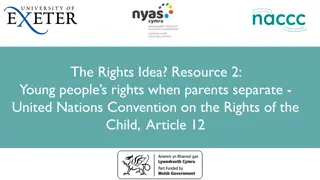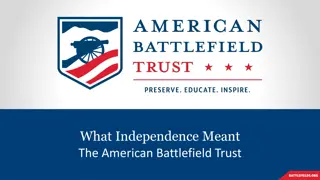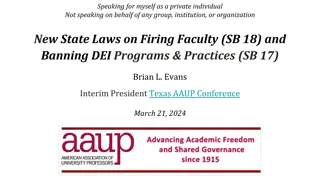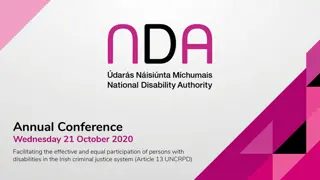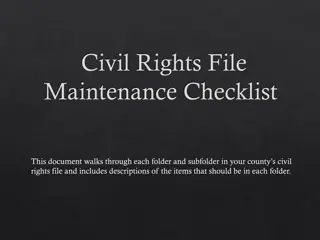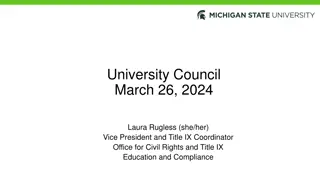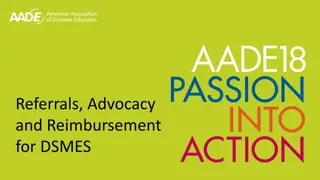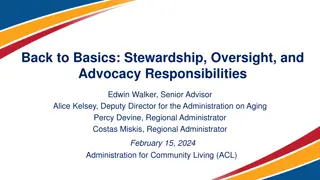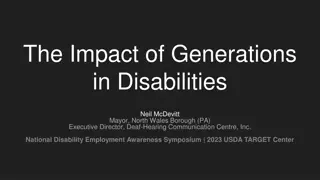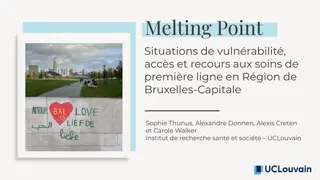Advocacy for Ensuring Independence and Rights in Meath/Louth Region
Advocacy is essential to support individuals facing challenges to their independence and rights, such as those with disabilities, communication difficulties, or vulnerable to exploitation. Independent Advocacy in Meath/Louth, represented by Maureen Finlay, ensures unbiased assistance and empowerment for those in need. Through case scenarios like Deprivation of Liberty, the importance of advocating for individuals' wishes and well-being is highlighted in navigating complex situations.
Download Presentation
Please find below an Image/Link to download the presentation.
The content on the website is provided AS IS for your information and personal use only. It may not be sold, licensed, or shared on other websites without obtaining consent from the author. Download presentation by click this link. If you encounter any issues during the download, it is possible that the publisher has removed the file from their server.
Presentation Transcript
Regional Coordinator Meath/Louth Introducing: Maureen Finlay
Why is advocacy needed? Why is advocacy needed? Many people face challenges to their independence due to physical or mental illness, intellectual, physical or sensory disability, lack of family and community supports or an inability to access public services that meet their needs. Some people communicate differently and with difficulty and some people slowly lose their ability to make and communicate decisions as a condition, such as dementia, develops over time. Some are abused and exploited because of their vulnerability. Others feel disregarded or let down by healthcare services while some are harmed through adverse events or medical negligence
Independent Advocacy Independent Advocacy Independent of family, service provider and systems interests Collaborates where possible . Challenges where necessary Speaks truth to power . and to the powerless A voice for the voiceless
Case scenario 1: Case scenario 1: Deprivation of Liberty Deprivation of Liberty M (72) admitted to hospital, transferred to a local nursing home where M believed she was receiving respite M inherited family home and small holding of land with understanding that sister (J) with mild cognitive impairment and slight disability would remain in family home for her life time Family applied for Fair deal which was declined following assessment of assets Paying 1,250 + additional charges per week
Case scenario 1: Case scenario 1: Deprivation of Liberty continued . Deprivation of Liberty continued . M s overall health condition improved with time and M wished to return home with DON s support (DON believed no valid reason to remain in Nursing home) DON contacted Sage Advocacy to seek independent support for M for safe discharge planning Family did not support or accept M s right and wish to return home
Case scenario 1: Case scenario 1: Deprivation of Liberty continued . Deprivation of Liberty continued . Following M s hospitalisation, M s sister (B) had moved into the family home to support sister who remained living there with a home care package from Disability and Mental Health Services B, was reluctant to support M returning home and refused to engage with any discharge planning process RC MF organised an MDT meeting which was attended by M, B and sister J, Social Worker (Disability services), Mental Health Services, GP and DON
Case scenario 1: Case scenario 1: Deprivation of Liberty continued . Deprivation of Liberty continued . RC MF articulated M s will and preference to return to her own home asap having already spent 18months in care at a cost of approx. 90k While in Nursing home, M was feeling lonely and depressed due to fact that she had full capacity and other residents where unable to engage or communicate with her, leaving M spending most of her day alone in her room At the same time, M was very concerned that her private funds were depleting, resulting in M feeling a lot of anxiety and stress
Case scenario 1: Case scenario 1: Deprivation of Liberty continued . Deprivation of Liberty continued . Following continued pressure from advocacy services and many long protracted meetings with all essential services necessary, M s voice was finally heard and a discharge plan was agreed with a small package of care provided + additional private care agreed for and paid by M Additional hours were also granted to provide support for J to continue to remain at home now that B stated she would no longer be involved with J s care due to M returning home
Case scenario 1: Case scenario 1: Deprivation of Liberty continued . Deprivation of Liberty continued . Process commenced on 10th November and completed by 12th December, M returned home just before Christmas, back in charge of her life, her home, her finances and her farm M expressed her feeling of being reluctantly allowed to return home, when in fact it was her choice and her right to do so This is an example of the wrongdoing that can take place on a vulnerable person who at the time was too ill to understand her situation or her rights
The focus should be on: Clients wishes Exploring options available Planned and organized transfer of care at home Instead, the focus was on: M s Capacity Family conflict and refusal to support M s wishes Other family member (sister B) care needs at home Because of: Barrier from family, refusing to support discharge, J wanting to remain in the family home instead
Case Scenario 2: Case Scenario 2: Deprivation of Liberty Deprivation of Liberty P (78) living in Council property for 26 years, without any issues and no formal supports Admitted to hospital 3 months ago following a fall at home Upon admission, deemed to have some breathing issues and concerns that he had not been looking after himself, assessed as being a falls risk Spent several weeks in hospital
Case Scenario 2: Case Scenario 2: Deprivation of Liberty Deprivation of Liberty P was discharged to a local nursing home on Transitional Care Funding, pending Fair Deal application P in nursing home 4-5 weeks prior to access to independent advocacy service RC MF visited P who was unaware and not consenting to being in Long Term Care P expressed felling of hopelessness and believe that he would not be able to return to community living due to fear of Council terminating tenancy
Case Scenario 2: Case Scenario 2: Deprivation of Liberty Deprivation of Liberty P s property had been a 2 bedroom, 2 story house with bedroom and bathroom upstairs which was no longer suitable with P s current circumstances Matter of urgency to engage with Council to support P in getting a transfer to a more suitable property due to the concern that while awaiting Fair Deal funding (where transitional funding was put in place), P would have to make a decision whether or not to accept Nursing home placement or pay privately while negotiating with Council for new placement
Case Scenario 2: Case Scenario 2: Deprivation of Liberty Deprivation of Liberty Initial response from Council was that they could not facilitate P due to recommendation by hospital that P could not manage to live independently P had no family support (was estranged from son) P became deflated due to believing that it was going to be impossible to have his wish to return to community living
Case Scenario 2: Case Scenario 2: Deprivation of Liberty Deprivation of Liberty MC MF reassured P that she would make every endeavour to support P to return to community Two further meetings took place with Council and P Offer finally made by Council of a 1 bedroom bungalow (which had just become vacant) which was also in the same area as previous property P was absolutely delighted to accept offer of 1 bedroom bungalow and expressed great appreciation to council and RC MF for the dedication and support given to him
Case Scenario 2: Case Scenario 2: Deprivation of Liberty Deprivation of Liberty Work had to be completed to make property habitable, strict deadline had to be agreed due to Nursing home costs becoming due RC MF made contact with P s niece with P s consent, who agreed to come on board and support P and visit on a regular visit once P returned to community PHN also agreed to look for a reasonable package of care in support of P which was granted quickly
Case Scenario 2: Case Scenario 2: Deprivation of Liberty Deprivation of Liberty Meeting arranged for next Tuesday between P, RC MF and Council to sign up for new tenancy and relinquish old tenancy. Full process to support P has taken 4 weeks from commencement to finish. This is a typical example of when services work together, best outcomes can be achieved
The focus should be on: Clients wishes Exploring options available Planned and organized transfer of care at home Instead, the focus was on: Client s Capacity Lack of Formal support or proper planning at hospital Council being advised of recommendation from hospital that client unable to live independently Because of: Limited information gathered from council Client not being involved in discharge plan No one to support P with wishes prior to RC MF involvement
Thank You Nothing about you /without you
